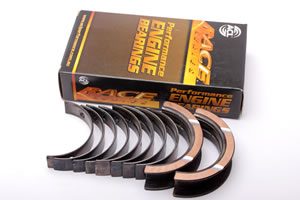


ACL's tri-metal race series bearings provide outstanding performance and dependability. The bearing construction features a high tensile steel backing, increased crush height for improved bearing retention and heat dissipation, and increased eccentricity to compensate for bore distortion and assist in the formation of hydrodynamic oil film. Our Coated bearings have a low friction surface coating to reduce friction and wear under adverse operating conditions.
Usually ships the next business day.
When should additional oil clearance be used? This decision is something the engine builder should make based on the various factors involved. Oil flow is responsible for carrying away a significant portion of the heat generated at the bearings. Sustained heavy loads and/or high rpms can lead to very high heat loads and OEM clearances, particularly at the tight end of the tolerance range, may not provide sufficient oil flow through the bearings to control these heat loads. Additionally, bearing housing distortion can pinch off the oil clearance and can cause journal to bearing contact. For these reasons increased bearing oil clearances may be required. However, oil viscosity and oil pump flow rates need to be considered to avoid a dangerous loss in oil pressure. An additional consideration will be thermal expansion differences. For example, an aluminum block subject to high temperatures will expand to a greater degree than the steel crankshaft and for this reason tighter main clearances may be called for.
Can the bearing sizes be mixed? As long as the bearing sizes are within 0.001" they can mixed in order to achieve the desired clearance. Using one bearing shell from a 0.001" oversize bearing set will increase the clearance by 0.0005".
What is the best method for measuring the bearing oil clearance? The most accurate method is to assemble the bearings into the housing (engine block or connecting rod) torqued to the correct specification and to measure the clearance using a ten-thousandths reading dial indicator bore gauge (Sunnen being the tool of choice of most high end builders). The dial bore gauge is set to the exact dimension of the crankshaft journal using a special setting tool and will display the oil clearance when inserted into the housing. Plastigage can be used as a rough check but is not accurate enough for high end engine building. Plastigage is plastic strip that is installed between the crankshaft journal and the bearing in the housing during a test assembly. After disassembly the crushed plastic strip is measured for width to determine what the clearance is.
What is blueprinting in terms of the bearing clearances? Most people interpret this term to mean that the dimensions of the engine are set to a more precise tolerance than the factory permits and to set the dimensions to the area of the factory tolerance range that will minimize friction and achieve the best possible power output. When it comes to bearing clearances this may mean selecting from several sets of bearings to find the necessary bearing shell thicknesses to set the exact clearances desired. A very accurate micrometer with special measuring tips to accomodate the curved shape of the bearing is necessary to evaluate the different bearing thicknesses.